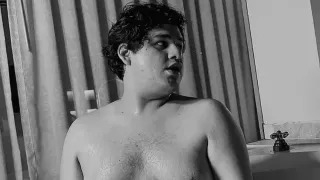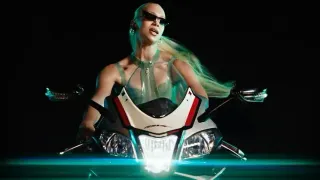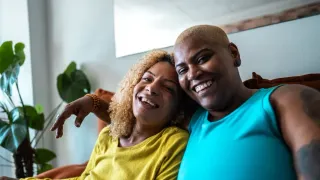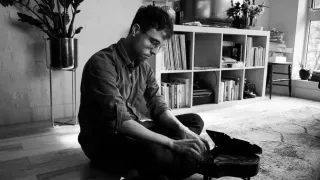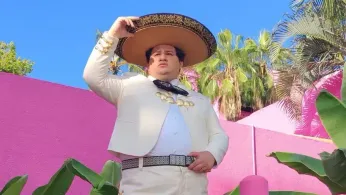
Nov 3
Fernando Carsa: From Acapulco’s Pool Boy to Queer Trailblazer Ready for Center Stage
READ TIME: 4 MIN.
When Fernando Carsa walks into a room, he doesn’t just arrive—he makes an entrance. For his recent interview with The Advocate, the "Acapulco" star ditched Memo Reyes’s iconic pool boy uniform for a flowing blue dress, coiffed hair, and a bold red lip. It’s a look that says, “This is Fernando, and he’s not hiding.” The contrast with his on-screen persona is more than visual—it’s emblematic of Carsa’s journey from beloved sidekick to queer icon, and it’s resonating powerfully with LGBTQ+ fans hungry for authentic representation.
Memo, Carsa’s character on "Acapulco", quickly became one of the show’s most endearing elements, capturing hearts with his innocence, wit, and unwavering loyalty. Now that the series has wrapped after four seasons, Carsa reflects on the bittersweet farewell, acknowledging the family forged in the crucible of COVID-era filming. “We started when COVID was still around, and that led us to film and live in the same place, which created this huge family. As sad as we are to say goodbye, we know the family is still going to stick around together,” he told The Advocate.
But for Carsa, the end of Memo’s story isn’t the end of his own. In fact, it’s the beginning of something far bigger. “Memo changed my life, but he also gave me the space to be me. That’s something I’ll carry forever,” he said
Carsa’s journey is marked by moments that feel tailor-made for a queer coming-of-age montage. Working alongside Regina Orozco, whom he calls “a larger-than-life queer icon in Mexico,” was a milestone. “When I first met her, I screamed at the top of my lungs. Working with her was a milestone for me,” he recalls. For Mexican LGBTQ+ audiences, Orozco’s presence signals hope and possibility—proof that queer talent can thrive on mainstream screens.
Then there’s the fanboy moment that every queer millennial can relate to: Carsa’s first encounter with Chord Overstreet, fresh off "Glee" fame. “I was obsessed with "Glee" as a kid, Carsa confessed. “So when I got on the van after landing at the airport to begin production, I hopped on and then realized I was sitting next to Chord, I was hyperventilating inside. He’s taller than I expected, even more gorgeous in person, and so kind. That was definitely a full-circle moment”.
For queer performers, being recognized beyond the characters they play is a victory. Carsa shares, “At first people recognized me as ‘the guy from "Acapulco"’ But now they stop me and say, ‘Are you Fernando Carsa?’ That feels very special, being seen beyond the character, being seen as myself”.
This shift—from being watched to being *seen*—is transformative for LGBTQ+ artists, whose identities have often been hidden, sanitized, or sidelined. Carsa’s openness, his willingness to be fully himself in public spaces, is a powerful act of resistance and affirmation.
With "Acapulco" behind him, Carsa isn’t slowing down. He’s launched into what he calls his “producer era,” having recently produced the short film "La Mosca en la Pared" (*Fly on the Wall*), which explores workplace violence—a topic that resonates with many marginalized communities. The film has already made its way into several festivals, signaling Carsa’s commitment to telling stories that matter, especially those that might otherwise go untold.
By stepping behind the camera, Carsa joins a growing movement of queer creatives reclaiming storytelling power. From Janet Mock’s work on "Pose" to Bowen Yang’s comedic genius on "SNL", the demand for authentic queer voices isn’t just about representation—it’s about who shapes the narrative.
Carsa’s next act? Music. He’s gearing up to release an EP featuring songs he wrote himself, collaborating with a producer who “gets” his vision. For queer fans, this is more than a side project—it’s a promise of joy, vulnerability, and the kind of emotional resonance only LGBTQ+ artists can deliver.
Music has long been a space where queer artists find and gift liberation—think Troye Sivan, Janelle Monáe, and Lil Nas X. Carsa’s foray into music is an invitation to dance, cry, and celebrate queer life in all its glorious complexity.
Looking back, Carsa is clear: “Luck is when opportunity meets preparedness,” he reflects. “I prepared my whole life for this moment”. It’s a mantra that resonates across the LGBTQ+ community—a reminder that queer success is often built on tenacity, grit, and readiness to seize the moment.
This gratitude is palpable. Carsa doesn’t just thank his castmates or fans; he thanks his younger self for the work, resilience, and hope that led him here.
In 2025, queer visibility is hard-won and deeply cherished. The end of "Acapulco" is not just a TV milestone; it’s an inflection point in Carsa’s career and in queer pop culture. As Latinx and LGBTQ+ communities continue to push for more authentic stories, Carsa’s trajectory is proof that you can be yourself—unapologetically, joyfully—and succeed.
His story is a rallying cry for every queer person dreaming of the spotlight, every trans artist hustling behind the scenes, every fan who just wants to see themselves reflected in the stories they love. Carsa is ready to take on the world—and he’s doing it in a dress, with a song, and a heart wide open.
“Memo changed my life, but he also gave me the space to be me. That’s something I’ll carry forever.”
And honestly? The world is lucky to have him.

